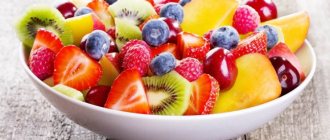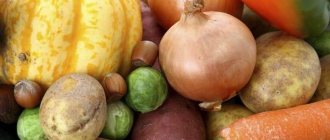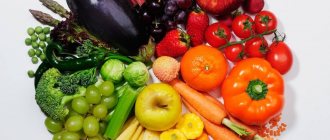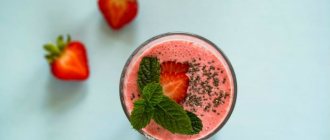You will be deficient in important macronutrients
Fruits and vegetables will provide you with fiber and carbohydrates, but they won't give you the fat and protein you need. And they are vital for the body. Fats are for brain health, sufficient energy and metabolism, proteins are for strong muscles and a strong immune system.
“If you eat only fruits and vegetables, you will lose muscle mass and strength,” says nutritionist Amy Shapiro. “A plant-based diet can provide protein, but it needs to include grains.”
Main contraindications
The question of whether it is possible to lose weight if you eat only vegetables and fruits should not be asked if there are contraindications to following the diet. This diet is not suitable for people with the following pathologies:
- gastritis or stomach ulcer. Fruits contain a large amount of acid. Such acid can negatively affect the mucous membrane of the digestive organs. In this case, only a mono-diet that involves the inclusion of bananas in the diet may be suitable. This diet helps normalize the functions of the gastrointestinal tract;
- allergic reaction to fruits;
- period of pregnancy and breastfeeding. The diet of a woman expecting a child and an expectant mother should include a variety of foods. Otherwise, serious consequences may arise for the baby;
- disturbance of carbohydrate metabolism;
- increased blood sugar concentration.
Older people should not follow a fruit diet. At this age, nutrition should be balanced.
Your inflammation levels will decrease
Inflammation occurs when the body tries to defend against viruses and bacteria or repair damaged tissue. But some foods—among them meat, cheese, and processed foods—enhance Dietary pattern analysis and biomarkers of low-grade inflammation: a systematic literature review. inflammatory processes.
This negatively affects the body: chronic inflammation is associated with the development of atherosclerosis, increasing the risk of heart attack, stroke, diabetes and autoimmune diseases. .
A plant-based diet, on the contrary, reduces inflammation due to the high content of fiber and antioxidants in the diet. In addition, this diet is significantly lower in inflammatory triggers, including saturated fat and endotoxins (these substances are released when bacterial cells break down).
According to scientists, in people who switched to a plant-based diet, the level of C-reactive protein, an indicator of inflammation, sharply decreases.
What are the disadvantages of fruit eating?
According to a study by Klaus Leitzmann conducted by the University of Giessen in Germany in 1996-1998, most people who give up meat, dairy products and processed foods experience complications. For example, a third of the women examined under the age of 45 suffered from amenorrhea (lack of menstruation). Iron deficiency anemia was also found in 45% of men and 15% of women, and a deficiency of calcium, iron, magnesium, iodine, zinc, vitamins E, D and B12 was detected in the blood of all participants.
Photo: istockphoto.com
However, our interlocutor assures that she did not experience any health problems while adhering to fruitarianism. She did not feel a lack of essential elements and never took vitamins or nutritional supplements. Nastya believes that her body received from living food exactly as many substances as it needed and as much as dead food would not provide.
One of the tangible difficulties was adaptation to society. Fascinated by the new philosophy of life, the girl stubbornly tried to convey the truth to those around her.
When I switched to fruit eating, I started telling everyone left and right that they should only eat fruit. Everyone looked at me, twirling their finger at their temple. Now, however, I understand that I scared people away with my assertiveness, persistence and unhealthy fanaticism. This ideology was life for me, and I thought that this was the only way to live correctly. Now I realize that you can’t do that: everyone still has their own views and their own truth.”
You will become less energetic
On average, a man with a moderately active lifestyle needs Calculating how many calories are burned in a day 2,400–2,800 calories per day, and a woman needs 1,800–2,200. But if you do not eat grains, seeds, nuts and vegetable oils, it is extremely It's hard to get that many calories. To give you an idea, 2,200 calories is about 100 cups of chopped cabbage or 23 apples.
Of course, there are higher calorie vegetables, such as avocados. But even if you diversify your plant foods as much as possible, you will still have to eat a lot. At the same time, you will not get the type of carbohydrates that provide energy and help you concentrate.
Quitting the diet
In order for the results of weight loss to be preserved after finishing the vegetable and fruit diet, you need to exit it correctly. It is recommended to do fruit or vegetable fasting days once a week. A good strengthening effect comes from physical education, running, and swimming.
A useful and effective method for losing weight can be used several times a year, and it is necessary to maintain a pause between diets of at least two months. More frequent stay on such a diet can disrupt the metabolic processes in the body of someone losing weight.
More fresh and relevant information about health on our Telegram channel. Subscribe: https://t.me/foodandhealthru
We will be grateful if you use the buttons:
You will be left without important vitamins and minerals
"A diet where fruits and vegetables are the only source of energy will be deficient in key nutrients," says nutritionist Stephanie Di Figlia-Peck. While many popular diets, including the Mediterranean diet, are high in fruits and vegetables, they also include other types of foods in a balanced manner.
An exclusively plant-based diet will not provide the body with vitamins B12 and D and will provide little iron. And although spinach and other dark leafy greens are rich in iron, they also contain phytates, which block Mineral Absorption from absorbing this trace mineral.
Is it possible to eat only vegetables for weight loss: let’s figure it out
shutterstock.com Vegetables are one of the important components of the diet that many people ignore. They become a gastrointestinal nutrient for those who maintain or lose weight.
Vegetables contain a large amount of fiber, vitamins and vegetable protein, which in some respects surpasses animal protein. For example, 100 g of beans contains 21 g of protein, and 100 g of beef contains 19 g.
(shutterstock.com)
Why you should eat vegetables
Proper vegetables, green and low in calories, do not contain fats, cholesterol and harmful additives. The composition is more than transparent: the task is only to steam the dish or with minimal use of oil.
With vegetable dishes, a person receives fewer calories than he expends. Some vegetables rich in fiber are called negative calorie foods: the body spends more energy processing than it receives.
If you eat a burger or pizza, you will want to eat again within an hour, while vegetables swell in the gastrointestinal tract and provide a feeling of fullness for several hours. Therefore, every or most meals should start with vegetables or a bowl of salad. This will allow you to eat less other food and provide the body with energy and nutrients.
(shutterstock.com)
Vegetables also remove excess fluid, speed up metabolism, cleanse the intestines, saturate the body with vitamins, microelements, amino acids, are slowly digested and suppress appetite, and improve digestion.
Starchy and non-starchy vegetables
Vegetables are divided into two groups due to their different carbohydrate content. Non-starchy - low-carbohydrate vegetables that do not need to be limited in the diet: peppers, spinach, broccoli, green leafy vegetables, cucumbers, asparagus.
Vegetables with higher calorie content: Brussels sprouts, cabbage, cauliflower, tomatoes, leeks. Starchy vegetables: legumes, potatoes, green peas, corn, beets, rutabaga, chestnuts, radishes, zucchini, squash, plant roots (parsley, parsnips, celery, horseradish), pumpkin, radishes. In the process of losing weight, it is better to reduce their amount, otherwise you may not lose, but gain weight.
Why can't you just eat vegetables?
Raw vegetables can lead to intestinal disorders: there are consequences in the form of bloating, heartburn, diarrhea, and abdominal pain. Therefore, raw vegetables should be alternated with stewed, boiled, baked or steamed dishes. It is better to exclude or minimize fried vegetables. Vegetable dishes can be served with lean fish and meat, herbs, spices and lemon juice.
Every day you need to drink one and a half to two liters of water: this starts your metabolism and is necessary if you consume a lot of fiber.
(shutterstock.com)
What vegetables can you eat on a diet?
(shutterstock.com)
- spinach;
- cucumbers;
- celery;
- green bean,
- cabbage;
- green salads: arugula, kale, pak choy, chard, watercress;
- dill, parsley;
- heat-treated cruciferous vegetables: Brussels sprouts, cauliflower, broccoli, kale, bok choy.
Vegetable salad recipes
With Chinese cabbage
Ingredients: 400 g Chinese cabbage, 150 g tomatoes, 150 g cucumbers, cilantro, dill, parsley, a spoonful of olive oil, salt to taste.
Shred the cabbage, chop the cucumbers and tomatoes. Chop the greens. Mix vegetables, season, salt.
"Brush"
Ingredients: 100 g white cabbage, apple, carrots, 100 g cabbage, 30 g prunes, teaspoon lemon juice, tablespoon olive oil.
Rinse and grate the vegetables on a coarse grater. Stir and mash until the juice comes out. Grate the apple, sprinkle with lemon juice, add to the ingredients. Soak prunes in water, cut into strips, add to salad, season with olive oil. For a better cleansing effect, it is better not to add salt to the salad.
(shutterstock.com)
With tuna
Ingredients: onion, a can of tuna in its own juice, two eggs, two tablespoons of olive oil, 30 g of olives, two cucumbers, herbs.
Chop the onion and divide the tuna into pieces. Chop the cucumbers and tomatoes and add to the plate with the tuna and onions. Boil and chop the eggs, chop the herbs. Cut the olives into halves. Mix the ingredients and season with oil.
Interesting facts about fiber
Fiber contains much-needed antioxidants for the body. Thanks to them, the aging process slows down, immunity increases, and cells are renewed.
In addition, if the required amount of this element is supplied with food, then carbohydrates and fats are slowly absorbed, which leads to a rapid appearance of satiety and a decrease in sugar levels. That is why nutritionists advise not to forget about a portion of vegetables at every meal.










